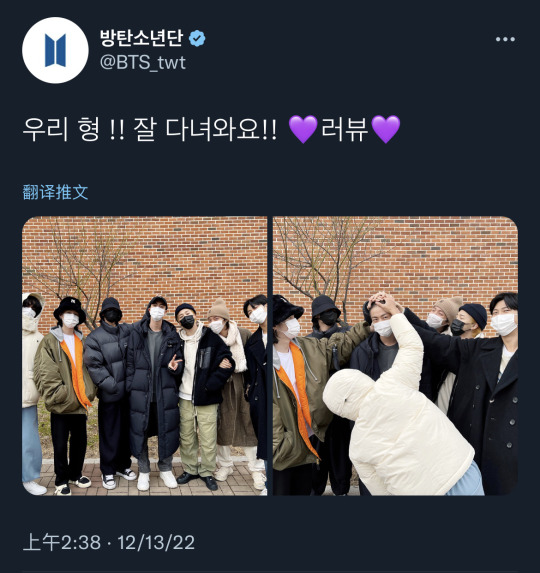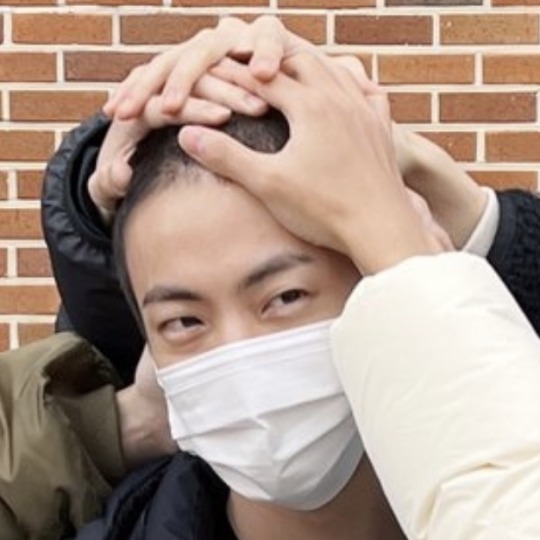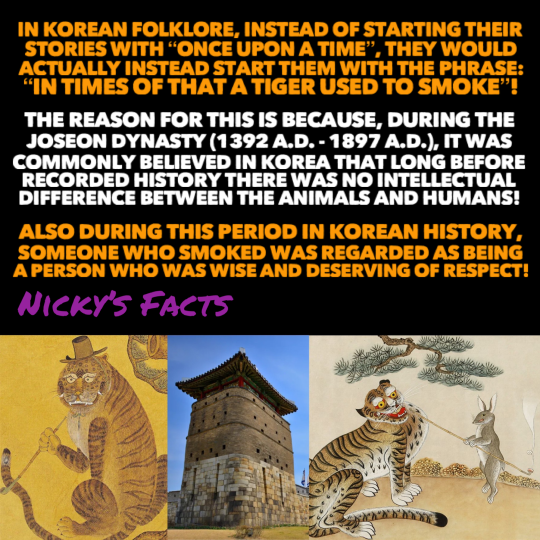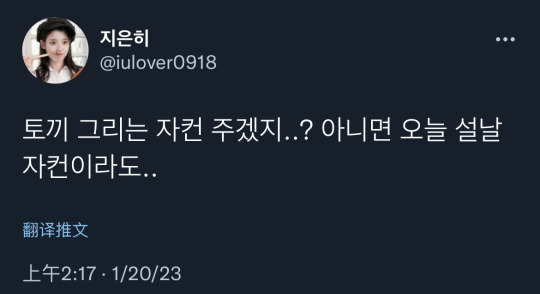#korean phrases
Photo

아무리 바람이 세차게 불어도
산은 바람에 고개를 숙일 수 없다
No matter how the wind howls,
the mountain cannot bow to it
- from Disney Movie: Mulan
✏️ 𝐕𝐨𝐜𝐚𝐛𝐮𝐥𝐚𝐫𝐲:
아무리 (adv): no matter how, however, whatever
바람 (n): wind
세차다 (adj): strong, rough
불다 (v): blow
산 (n): mountain
고개 (n): head
숙이다 (v): bow, bend
✏️ 𝐆𝐫𝐚𝐦𝐦𝐚𝐫:
1. (아무리) A/V-아/어도 grammar = even if, no matter how ~a situation occurs regardless of the previous action
E.g.
아무리 바람이 세차게 불어도 = No matter how strong the wind blows
2. V-(으)ㄹ 수 없다 grammar = can't (do V)
E.g.
고개를 숙일 수 없다 = can't bow down
🌸 🌼 🌻
Support me at: https://koreanlanguageloving.my.canva.site/
#Korean Quotes#Korean Phrases#Learn Korean#Study Korean#Hangul#Motivational Quotes#Disney Quotes#Korean Language#korean langblr#인생명언#한국어공부중#한국어 공부하기#한국어공부#한국어 문법#한국어#한국어능력시험#한국어배우기#한국어배우#한국어 배우
106 notes
·
View notes
Text

Korean Self-Love Quotes/Proverbs & Life Lessons
남의 떡이 더 커보인다.
Literal Translation: The other person’s rice cake is bigger than yours
Meaning: don’t compare yourself or your life with someone else’s
Life Lesson:
Especially on social media, you only see the parts that other people choose to show - the highlights, but not the behind the scenes. You’re life is not better or worse than another persons. The grass always looks greener on the other side, but you never know what that person is going through behind the scenes. Don’t try to trade your life in for another person’s just because of how things appear on the outside.
Vocab from proverb:
남 - another person, stranger
의 - possessive particle (‘s)
떡 - rice cake
더 - more
크다 - big
아/어 보이다 - to look, appear, seem
엎질러진 물이다
Literal Translation: It is spilled water.
Meaning: There is no use in crying over spilled milk.
Life Lesson:
A lot of things in life aren’t worth crying over, especially if it’s something that happened in the past. The past is the past and we have to learn to let go of the past. If you dwell on your failures, your shortcomings, your embarrassing moments, or any other terrible things you may have experienced in the past - It will keep you from living in the present. You Can Not Change The Past - no matter how much you think about it, so there’s no use “crying” over it. Don’t let the past determine who you are today. Whenever you catch yourself worrying too much about a past occurrence, tell yourself, “It already happened and I can’t control that, but I can control what I do today”.
Vocab from proverb:
엎질러지다 - to spill
물 - water
똥이 무서워서 피하니? 더러워서 피하지.
Literal Translation: you don’t avoid poop, because it’s scary. You avoid poop because it’s dirty.
Meaning: you should avoid certain things and people in your life, not because you are scared, but because it will disrupt your peace and happiness.
Life Lesson:
If at all possible try to remove or minimize contact with toxic people in your life - even if that just means distancing yourself from them mentally. Also avoid overtly negative and toxic situations whenever you can, because it can improve your mental health and overall happiness. Holding on to grudges, anger, sadness, etc. can also be harmful to your mental health - It may be hard to hear but some things you have to let go of. For yourself and your peace of mind. Forgive yourself of any past mistakes or failures and allow yourself to move forward.
Vocab from proverb:
똥 - poop
무섭다 - be scared of
아/어/해서 - because
피하다 - to avoid
니? - informal question ending
더럽다 - to be dirty
지 - shortened form of 지요 / 죠
(when speaker confirms something they thought the listener already knew)
말을 냇가에 끌고 갈 수는 있어도 억지로 물을 먹일 수는 없다
Literal Translation: You can lead a horse and go to a stream, but you can’t make it drink water through its own will
Meaning: You can lead a horse to water, but you can’t make him drink
Life Lesson:
You can’t force someone to do something that they don’t want to do. You can’t change someone who isn’t willing to change. You can’t save someone who doesn’t want to be saved. You can’t help someone who doesn’t want to be helped. There are many ways to say it, but the overall message is the same.
On the opposite side of the coin, It’s a great idea to be open and willing to positive changes and to growth. In life you want to always be growing and not static - unless your perfect (which no one is). Sometimes we may feel static and like we are going no where no matter how hard we try to move. In those cases, either you need to make a change and do something a bit different or you are moving forward but it’s just so slowly that you don’t notice it - taking a step back and looking at your situation objectively can sometimes help.
Vocab from proverb:
말 - horse
냇가 - stream (of water)
끌다 - to lead
고 - and
가다 - to go
ㄹ 수 있다 - can do
아/어도 - even if
억지 - force
(으)로 - by (explain methods)
억지로 - by force
물 - water
먹이다 - to feed, make eat/drink
ㄹ 수(는) 없다 - can’t
(the 는 adds emphasis)
That's all for this post! Which proverb is your favorite?
#study korean#한국어#korean langblr#korean language#한국어 공부#korean proverbs#korean quotes#korean phrases#korean culture#한국문화#속담#한국어 단어#korean vocab
176 notes
·
View notes
Text
Daily Korean Vocabulary #12

도자기 — pottery
나는 일주일에 한 번 도자기 수업을 들어요. —
I take a pottery class once a week.
#korean learning#korean vocabulary#learning korean#korean language#한국어#korean langblr#korean phrases#한글#langblr
86 notes
·
View notes
Photo

How to say friend in Korean| The meaning of 친구 (chingu)
Friend in Korean is literally translate to 친구 (chingu).
Here’s how to say Friend in Korean language in formal, causal and polite situations.
Friend in Korean (Standard) - 주세요 (juseyo)/주시겠어요 (jusigesseoyo)
Friend in Korean (Informal)-줘 (jwo)
Friend in Korean (Formal)-주십시오 (jusipsio)/주시기 바랍니다 (jusigi baramnida)
Note
Age is very important in Korea.So It sounds rude to call someone who is older than you “chingu”. You can only use Chingu” with people of a similar age or with close friends.
Example
We have a mutual friend.
우리 둘 다 아는 친구가 있어.
A friend in need is a friend indeed.
어려울 때 친구가 진정한 친구다.
He's a friend of a friend.
그는 내 친구의 친구야.
We met through a friend.
우린 친구 통해서 알게 되었어.
Is he a friend of yours?
그 사람이 당신 친구인가요?
This is my friend Tom.
여기는 제 친구 톰입니다
My daughter’s spending the night with a friend.
우리 딸은 친구와 함께 밤을 보내고 있다
The correct meaning of best friend in Korean
The most common way to say best friend in Korean is 베프 (bepeu) but there are others way to say “best friend which is 가장 친한 친구 [ga-jang chin-han chin-gu] and 절친 [jeol-chin].
It’s also possible to use the Konglish expression 베스트 프렌드 [be-seu-teu-peu-ren-deu] which means best friend.
If you want to say “great friend.” in Korean, you can say 절친 (jeolchin), shortened from 절친한 친구 (jeolchinhan chingu)
베프 (bepeu) is the Korean slang word for friend in Korean. It’s a cute version.
Example
I'm about to have dinner with my best friend.
나는 베프와 이제 막 저녁을 먹으려던 참이야
How are things going with your new best friend?
너의 새로운 베프와는 어떻게 되고 있니?
My best friend keeps trying to set me up on dates.
내 베프가 계속 소개팅을 주선해줘.
You're my buddy, my pal, my best friend.
나는 내 친구, 내 동료, 내 베프야
Who is your best friend?
누가 너의 제일 친한 친구니?
Are Dogs Really Man's Best Friend?
개는 정말 인간의 가장 좋은 친구일까?
James is my best friend.
제임스가 제일 친한 친구에요
I fought with my best friend.
나는 제일 친한 친구와 싸웠다.
I lost my temper and punched my best friend.
화가 나서 내 단짝 친구를 한 대 쳤어.
How to address your friend in Korean
When you know someonebut not friends yet, you can address them as 아는 사람 (aneun saram) means “a person I know”
It is similar to the english word “an acquaintance”
Unlike english, In Korea you can refer someone as friend iif you are close with and you both are of same age (donggab/동갑).
how can you introduce them?
When to add ‘-ah’ after someone’s name
If your friend is same age or younger than you , you can say their name in Korean add “ah/아” or “yah /야” to the end of the name.
If their name ends at consonant , add 아 at the end of their name
If their name ends at vowel add “yah /야” at the end of their name
Example
정수 (Jungsoo)becomes 정수야
혁재(Hyukjae)becomes 혁재야
동해(Donghae)becomes 동해야
이특(Leeteuk)becomes 이특아
은혁(Eunhyuk)becomes 은혁아
도윤(Do-yun)becomes 도윤아
However, if your friend is older than you, you need to address them different title like noons, huyng,unni and oppa in Korean
So the Korean words below can be used to address your older “friend” in if you’re speaking to your female or male friend like this
Someone younger than you- 동생 (dongsaeng)
If you are a male and A male who is older than you-형 (hyeong)
If you are a male and A female who is older than you- 누나 (nuna)
If you are a female and A male who is older than you- 오빠 (oppa)
If you are a female and A female who is older than you-언니 (eonni)
Example
TAEHYUN oppa is here
태현이 오빠 왔어요.
Jiyeon-unni!,i love you
지연 언니! 너무 사랑해요.
Hyori-nuna i miss you
효리누나 보고 싶어요
JinSoul oppa, buy me this
진소울 오빠, 이거 사줘.
Here’s a another way you can address a person is to call them sunbae/선배 means senior at school or the work place.
#korean#learn korean#korean vocabulary#korean words#korean phrases#korean language#kpop girls#korean grammar#korean alphabet#speak korean#how to say#study korean#korea#south korea
7 notes
·
View notes
Text
[Korean->English] @BTS_twt 2:38 AM December 13th 2022 Tweet - Color Coded Translation
Link to original tweet
I had my first actual Korean class today, so here’s a celebratory post 🎉

—
우리 형 !! 잘 다녀와요!! 💜러뷰💜
Our big bro !! Have a good trip!! 💜Love you💜
—

—
Please correct me if I made a mistake.
#color coded translation#learn korean#korean phrases#korean translation#beginner korean#korean language#korean vocabulary#korean#korean learning#korean to english#bangtan boys#bangtan#bangtan sonyeondan#bts twt#bts jin#bts kim seokjin#kim seokjin#jin bts#learn korean with kpop#kpop news
4 notes
·
View notes
Text
📚 Proverbi ed Espressioni Idiomatiche della Lingua Coreana 🇰🇷 📌 ⚙️↪ Lo studio è in ottica dell' Esame Topik ✅ !** ■ Reference and Practice KoreanTextbook aimed to Korean students 🌟 to obtain a successful command of the Korean Language in the view of the #Topik Preparation + Exercises 📖✏️ for Review and Self-Evaluate 🌟 🔴 with TOPIK-style Reading Questions 🔎 and QR Contents 🔗↔...**Train Yourself 🎯 to Korean Studying ! ... _>>
#bilingue#lingue straniere#korean#studying Korean#Korean Study#korean books#corea del sud#proverbi#Citazione del giorno#korean proverbs#korean phrases
0 notes
Text
𝐏𝐇𝐑𝐀𝐒𝐄 𝐎𝐅 𝐓𝐇𝐄 𝐃𝐀𝐘!
저 지금 빵집에 있어요. 빵 먹고 싶어요?
————
저 = I.
지금 = now.
빵집 = bakery (빵 = bread // 집 = house)
에 = at
있어요 = am (verb to be)
빵 = bread
먹 = eat
고 싶어요? = want to?
I am at the bakery (right) now. Do you want to eat bread?
#gigiskjourney#phrase of the day#korean langblr#korean language#korean learning#korean study#korean vocab list#korean vocabulary#learn korean#learning korean#studyblr#korean vowels#korean grammar#korean study blog#study korean#studying korean#south korea#korea#korean#한국어
48 notes
·
View notes
Text
Phrases of the Week #1
발 디딜 틈이 없다: to be crowded, packed
(lit.) no room to place one’s feet
이 음식점은 회사원들이 많이 와서 점심시간에는 발 디딜 틈이 없다. A lot of office workers come to this restaurant, so it’s crowded at lunch time.
출퇴근 시간에 지하철은 발 디딜 틈도 없다. During rush hour, the subway gets jam-packed.
발목을 잡다: for something to hold you back, for something to catch up with you
(lit.) to grab one’s ankle
일이 그의 발목을 잡고 있어서 그는 휴가를 갈 수 없었다. He could not go on a holiday because he was chained to his work.
그녀는 언젠가는 자신의 과거 문제들이 결국 자기 발목을 잡게 될 거라고 두려워했다. She was terrified that one day her past problems would catch up with her.
입에 게거품을 물다: to foam at the mouth (in anger)
내가 돈을 더 달라고 하자 그는 입에 게거품을 물었다. He frothed at the mouth when I asked for more money.
그가 나에게 욕을 하기 시작하며 입에 게거품을 물었다. He started swearing at me and was foaming at the mouth.
12 notes
·
View notes
Text

Korean legends come from a time before a intervention was held for the tigers involving their smoking addiction!😂
🚬🐅
#history#korea#in times of that a tiger used to smoke#folklore#tiger#once upon a time#korean history#joseon dynasty#fairy girl#fairycore#asia#animal history#smoking#korean culture#folktales#legend#historical writing#fairy tales#animals#phrase#korean folklore#nickys facts
56 notes
·
View notes
Photo

될 인연은 그렇게 힘들게
몸부림치지 않아도 이루어져요.
자신을 너무나 힘들게 하는 인연이라면
그냥 놓아주세요.
- 혜민 스님, <멈추면 비로소 보이는 것들>
If a relationship is meant to be, it will comes true
even without struggling so hard.
If a relationship is making you struggle too much,
just let it go.
- Haemin Sunim, <The Things You Can See Only When You Slow Down>
✏️ 𝐕𝐨𝐜𝐚𝐛𝐮𝐥𝐚𝐫𝐲:
되다: turn, become
인연: relationship, connection
그렇다: so, as such, like that
힘들다: hard, difficult, tough
몸부림치다: struggle
이루어지다: be achieved, be accomplished
자신: self, oneself
너무나: too, excessively
그냥: just, as it is, as it stands
놓아주다: let go, set free
#KoreanLanguage #LearnKorean #Studywithme
🌸 🌼 🌻
Support me at: https://koreanlanguageloving.my.canva.site/
#인생명언#Korean Quotes#Korean Phrases#Learn Korean#Study Korean#Korean Language#Korea Langbr#Hangul#한국어공부#한국어 공부하기#한국어 문법#한국어 단어#한국어 연습#한국어#한국어공부중
82 notes
·
View notes
Text

Korean Airport & Airplane Phrases
기내 좌석 - an in-flight seat
1등석 - first class
2등석/비즈니스석 - business class
3등석/일반석 - economy class
복도 측 좌석 - aisle seat
중간 좌석 - middle seat
창가 측 좌석 - window seat
항공편 - flight
국내선 - domestic flight
국제선 - international flight
연결편 - connecting flight
전세기편 - chartered flight
직항편 - direct flight
비행기 관련 표현 - Airplane related expressions
What time does your flight arrive? - 몇 시 비행기로 오시나요?
Examples:
The flight will arrive at Incheon International Airport at 10 o'clock. - 비행기는 인천국제공항에 열시에 도착할 예정입니다
How was your flight? - 비행기 여행은 어땠어요?
When is boarding time? - 비행기 탑승 시간은 언제입니까?
I'll be on NY Airline 767. 저는 NY항공 767편을 타고 갈 거예요
The flight was delayed for two hours and I missed my connecting flight from Madrid to Munich.
비행기가 두시간 지연되는 바람에 마드리드에서 뮌헨까지 가는 연결편을 놓쳤다
자리를 찾을 때 - When looking for your seat
제 자리가 어디인지 찾아 주시겠어요? - Could you find me my seat, please? / Can you help me find my seat, please?
뒤쪽으로 들어가세요 - Please go to the back,
손님 좌석은 비행기 좌측[우측]입니다 - Your seat is on the left[right] side of the lpane.
제가 창가 자리인데요 - I think I have the window seat.
복도 쪽 자리로 바꿔도 되나요? Can I change my seat to an aisle seat?
일행과 함께 앉고 싶어요 - I'd like to sit with my friend(s).
기내 서비스 - In-flight service
가방 좀 선반에 올려 주시겠어요? - Can you help me put my bag up (in the baggage comparment)?
신문이나 잡지를 드릴까요? - Would you like newspapers or magazines?
마실 것 좀 드릴까요? - Would you like something to drink?
기내식이 나오나요? - Are meals provided? / Do you give meals on this plane?
식사는 어떤 걸로 하시겠어요? - What would you like?
저는 치킨요리로 하겠습니다 - I'd like the chicken. / Chicken, please.
의자를 바로 세워 주시고 테이블을 올려 주시기 바랍니다 - Please place[have] your seatbacks and tray tables in their upright positions.
담요 한 장 더 주시겠어요? - Can I get an extra balnket? / Do you have an extra balnket?
지금부터 면세품 판매를 시작하겠습니다 - We will now begin our duty-free service.
현금이나 신용카드 모두 받습니다 - We accept cash or credit.
개인당 담배 두 보루와 술 한 병까지만 구입하실 수 있습니다 - Each person is only permitted to purchase two cartons of cigarettes and and one bottle of alcohol.
입국 신고서를 작성해 주세요. - Please fill out your disembarkation card.
기내 방송 - in-flight broadcast
승객 여러분, 저는 이 비행기의 기장입니다 - Ladies and gentlemen, this is the capain speaking.
이륙하기 전에 약간의 지체가 있겠습니다 - There's going to be a slight delay before we take off.
곧 이륙하겠습니다 - We will be take off.
승객 여러분은 자리로 돌아가셔서 안전벨트를 착용해 주시기 바랍니다. - Please return to your seats and fasten your seat belts.
비행기 내에서는 금연입니다 - This is a nonsmoking flight.
이제 몇 분 후에 목적지인 인천국제공항에 도착할 것입니다 - We will be arriving at Incheon International Airport in a few minutes.
지연되어 죄송합니다 - We applogize for the delay.
즐거운 비행이 되셨기를 바랍니다. NY항공을 이용해 주셔서 감사합니다 - We hope you had a pleasant flight. Thank you for flying NY Airlines.
다시 모시게 되길 바라겠습니다 - We look forward to serving you again.
#korean phrases#korean airport phrases#korean travel phrases#south korea#south korea travel#한국어#korean langblr#korean language
25 notes
·
View notes
Text
Korean and Spanish Vocabulary: Affirmations

긍정적인 확언 — afirmaciónes positivas — positive affirmations
자기긍정확언 — autoafirmaciones — self-affirmations
사고방식 — actitud — mindset
혼잣말 — auto hablar — self-talk
자기 사랑 — amor proprio — self-love
자기 존중 — auto respeta — self-respect
자존감 — autoestima — self-esteem
마음 챙김 — conciencia plena — mindfulness
감정 — sentimientos — emotions
자신감을 얻다 — ganar confianza — to gain confidence
존경하다 — respetar — to respect
시각화다 — visualizar — to visualize
일기를 쓰다 — escribir en un diario — write in a diary
연민을 느끼다/보이다 — sentir compasión/mostrar compasión — to feel/show compassion
신경쓴다 — importar — to care
(너는) 중요해요 — eres importante — you are important
난 똑똑해 — soy inteligente — I am smart
난 용감해 — soy valiente — I am brave
난 목표를 달성할 수 있어 — puedo lograr mi meta — I can achieve my goal
혼자가 아니야(예요) — no estás solo — you’re not alone
힘내세요 — ánimo — hang in there/cheer up (may not directly translate well)
앞으로도 파이팅! ¡sigue peleando/luchando! — keep fighting!
그냥 해봐(요)! — ¡adelante! — go for it!
네 자신을 믿어(요) — cree en ti mismo — believe in yourself
네가 최고야(예요) — eres el/la mejor — you’re the best
포기하지마(세요) — no te rindas — don’t give up
Since I think it’s important to write practice sentences, here’s a couple using two vocabulary words:
매일 아침 나는 거울에 비친 내 모습을 보며 긍정적인 확언 말을 반복한다. 그것은 나의 자존감을 높여줘요. — Cada mañana me veo en el espejo y repito afirmaciones positivas. Aumenta mi autoestima. — Every morning I look at myself in the mirror and repeat positive affirmations. It boosts my self-esteem.
*I’m not a native speaker of either Korean or Spanish, so please feel free to correct any mistakes you see!*
#korean langblr#korean vocabulary#korean phrases#spanish langblr#spanish vocabulary#spanish phrases#korean language#spanish language
131 notes
·
View notes
Text

To say the date in Korean, we start with the year, followed by months and days. To say a year in Korean, we add the 년(nyeon) to the end. (년-is a counter for years ) with Sino Korean numbers. Secondly, months in Korean are just numbers in Sino Korean with the ending 월 [wol]. And thirdly, to say the days in Korean, write the days in Sino Korean and add 일 at the end.
Here is the basic structure of each date in Korean
[ year in Sino Korean numbers] + 년 + [ month number] + 월 [wol] + [Sino Korean number] + 일
Before you practice, it’s best to know how to count Korean numbers 1-100 and beyond (at least 4 digit numbers).
Do you know how to count in Korean using Sino Korean Numbers yet?
If not, This Ultimate Guide will teach you to count Korea numbers 1-100 and up till billions sino Korean numbers system in 10 minutes with examples (free printable flashcards included)
Let me show you some examples.
5th December 2021- 이천이십일년 +십이월 +오일
23th February 2022-이천이십이년+이월 +이십삼일
1st January1997 – 천구백구구십칠년+일월 +일일
31st March 1982 – 천구백구팔십이년+삼월 +삼십일일
13th August 1990 -천구백구구십년+ 팔월 +십삼일
15th July1994 -천구백구구십사년+ 칠월 +십오일
Want to read in details . check out the complete video guide with free flashcards, quiz and pdf at fluenttongue.com
16 notes
·
View notes
Text
[Korean->English] @iulover0918 2:17 AM January 20th 2023 Tweet - Color Coded Translation - Lunar New Year 2023 Edition!
Link to original tweet

—
토끼 그리는 자컨 주겠지..? 아니면 오늘 설날 자컨이라도..
Can (you) show me how to draw a rabbit…? Or even if today is Seollal (Korean Lunar New Year) ..
—
Please correct me if I made a mistake. Please this one is really bad I must be wrong about this one.
#korean learning#korean to english#beginner korean#korean vocabulary#korean phrases#korean translation#korean language#learn korean#korean#color coded translation#polyglot thought translation
3 notes
·
View notes
Text
Pottery Barn rule, BL edition
If you aren't serious about your blorbo, you better figure out a way to not continue to lead him to think otherwise.

GIF by @theside-b
#he is now my blorbo too#h/t to @bengiyo for coining the phrase#obsessed with this show#and this character#love for love's sake#korean bl#kbl
15 notes
·
View notes
Text
I have a question for Genshin side of tumblr, especially the multilinguals and translators because I am on board with Alhaitham and Kaveh them being platonic or romantic but it just hit me after seeing user & artist eannagram bring it up on Twitter
Alhaitham says he has a house and even threatens to kick out Kaveh out- yet in all the English translations they use the word “roommates”. Kaveh is literally an architect so even if the place is small, it makes no sense for them to share a room based off their dynamic. And even if it was a dorm or apartment, roommates is still the incorrect phrase because housemates, dorm mates, & flat mates would all be a more accurate translations
Are they genuinely gay coded and this is how the EN team is getting the CN censorship across without explicitly saying it or is it a mistranslation and the EN team accidentally implied they’re a couple?
#mun post#please someone who has access and can translate the Chinese Korean and Japanese to compare look into this because it hadn’t occurred to me#like I would still use the phrase roommate but it’s odd that Genshin- a Chinese game that must abide chinese law- isn’t being specific#to avoid censorship issues#Genshin impact#kaveh x alhaitham#kavehaitham#kaveh#alhaitham#the Genshin en translation team has made many mistranslation errors so I wouldn’t be surprised#but on the other I’m fully on board with both - mistranslation or not#I just want to know if I’m being queer baited or not because m a n#I don’t mind subtly because I get it - the cn gov scary
70 notes
·
View notes